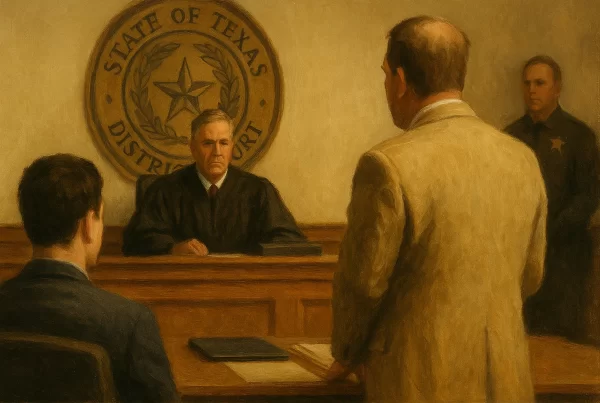Overview
The State Prosecuting Attorney is Texas’s top appellate criminal prosecutor, leading the Office of the State Prosecuting Attorney—a small agency established in 1923 to oversee criminal appeals at the state level. Representing the state before the Texas Court of Criminal Appeals, the office plays a key role in shaping legal precedent and ensuring the consistent application of criminal law across Texas.
Responsibilities
The primary responsibility of the State Prosecuting Attorney is to represent the state in all proceedings before the Texas Court of Criminal Appeals, the state’s highest criminal court. The office also has the authority to:
- Assist local prosecutors in appellate cases when requested.
- Represent the state at any stage of appellate criminal cases.
- Submit petitions, briefs, and oral arguments in cases significant to Texas criminal jurisprudence.
Key Legal Tools and Actions
- Amicus Curiae Briefs: In cases that have broader implications, the office may submit amicus briefs to advocate for consistent legal standards across Texas.
- Petitions for Discretionary Review: The office frequently files petitions asking the Court of Criminal Appeals to review significant lower court decisions.
- Briefs and Oral Arguments: The State Prosecuting Attorney submits written briefs and presents oral arguments in cases where the state’s interpretation of criminal law is at stake.
Appointment and Agency Structure
The State Prosecuting Attorney is appointed by the Texas Court of Criminal Appeals. She serves at the pleasure of the Court of Criminal Appeals and does not have a fixed term. Headquartered in Austin, the agency operates with a small team, including the State Prosecuting Attorney, assistant attorneys, and a legal secretary.
During proceedings before the Court of Criminal Appeals, the State Prosecuting Attorney may be assisted by a district attorney or county attorney.
Agency Background
In the early 1900s, criminal appeals in Texas were handled almost entirely by local district and county attorneys. As the volume of appeals grew and appellate law became more complex, concerns arose about inconsistencies in how criminal law was argued and interpreted across different jurisdictions. Important legal issues were not always presented clearly or uniformly before the Texas Court of Criminal Appeals.
To address these concerns, the Texas Legislature established the Office of the State Prosecuting Attorney in 1923. The office was created to promote consistency in Texas criminal appellate law by ensuring that the state’s legal position was effectively represented at the highest level.
Today, by representing the state before the Texas Court of Criminal Appeals, the office helps shape legal precedent and promotes uniform application of criminal statutes. Beyond its core appellate role, the office monitors legal developments, advises prosecutors across Texas, and may submit amicus curiae briefs in cases with broader implications for the state’s criminal justice system. The State Prosecuting Attorney may also provide legal analysis to the Texas Legislature or participate in policy discussions on criminal law reforms.
Despite its small size, the office plays a significant role in the legal landscape. It collaborates with district attorneys, county attorneys, and other prosecutorial and law enforcement agencies to strengthen criminal appeals. While it does not handle trial-level prosecutions, its appellate work clarifies legal interpretations and influences future cases. Through its advocacy and legal arguments, the office continues to shape the development of Texas criminal law.



